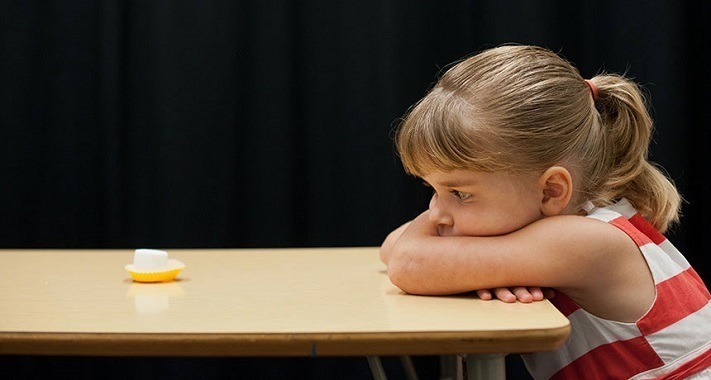Marshmallow Test with a twist: 3- and 4‑year-olds kids display more self-control when their reputation is at stake
 Children Will Wait to Impress Others—Another Twist on the Classic Marshmallow Test (Association for Psychological Science):
Children Will Wait to Impress Others—Another Twist on the Classic Marshmallow Test (Association for Psychological Science):
If you asked people to name a famous psychology study, the “marshmallow test” would probably come out near the top of the list. In this task, young children are told they can immediately get a small reward (one marshmallow) or wait to get a bigger reward (two marshmallows)…
A new study published in the journal Psychological Science expands on this earlier research … The researchers told the children that they could earn a small reward immediately or wait for a bigger one. Children were assigned to one of three conditions: a “teacher” condition, in which they were told that their teacher would find out how long they wait; a “peer” condition, in which they were told that a classmate would find out how long they wait; or a “standard” condition that had no special instructions.
Children waited longer in the teacher and peer conditions than in the standard condition, and they waited about twice as long in the teacher condition as compared to the peer condition.
The researchers were surprised by their findings because the traditional view is that 3- and 4‑year-olds are too young to care about what other people think of them.
“The children waited longer in the teacher and peer conditions even though no one directly told them that it’s good to wait longer,” said Heyman. “We believe that children are good at making these kinds of inferences because they are constantly on the lookout for cues about what people around them value. This may take the form of carefully listening to the evaluative comments that parents and teachers make, or noticing what kinds of people and topics are getting attention in the media.”
The Study:
Delay of Gratification as Reputation Management (Psychological Science).
- Abstract: Although delay-of-gratification tasks have long been used as measures of self-control, recent evidence suggests that performance on these tasks is also driven by rational decision processes. The present research examined whether the effects of rational decision processes extend beyond costs and benefits embedded in the task itself to include anticipated consequences for the child’s reputation. Across two studies, 3- and 4‑year-olds from China (N = 273) were assigned to a standard delay-of-gratification condition or to a reputation condition in which they were told that their teacher or a peer would find out how long they had waited. Children waited longer in the reputation conditions and longer in the teacher condition than in the peer condition. This is the first evidence that children’s performance on a delay-of-gratification task is sensitive to reputational concerns and to the identity of potential evaluators of their behavior.


